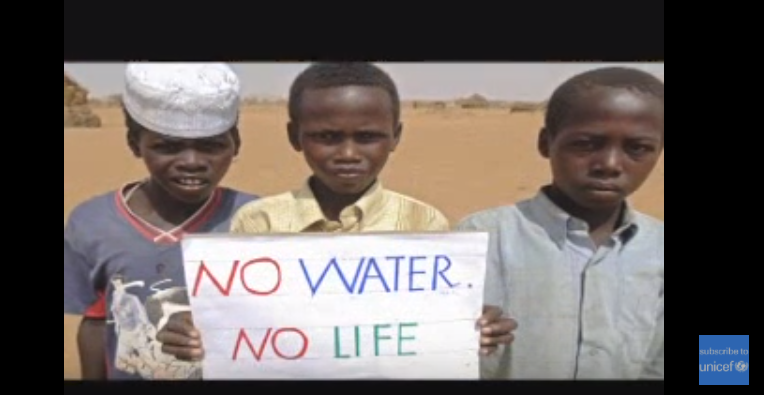Children's Climate Rights
CLIMATE SYSTEM EMERGENCY INSTITUTE
UNICEF 2015 Unless We Act Now
Rights for Future Generations /Inter-generational Equity.
The rights of future generations expressed as inter-generational equity is the key principle of sustainable development agreed to by all countries under the 1992 UN Earth Summit and reaffirmed under the UN 2012 Rio+20. However, till recently there were no future generations legal rights under democratic governance internationally or by developed nation governments, on the basis that only the living can have such rights, though economics by future discounting denies future generations the same economic benefits than the present. There are now some counties that include rights for future generations.
The long known multiple impacts of global climate change impacts children the most is the human right issue of all time. Already occurring impacts and the higher degree of global climate change already committed makes this the crime of all time.
In today's situation of global emissions not falling the emissions of the present will hit the future much harder with climate change impacts.
Children are more vulnerable to all impacts of global change. An additional vulnerability is climate change commitment from climate stem inertia and momentum. Due to the ocean heat lag climate system inertia, today's emissions by adults will impact their children in about one decade to three decades and the degree of children change they experience over their lifetime, will be at least 50% higher than today's. The total burden of many impacts will be far worse. Presently there is no proven way to lessen or reverse impacts.
Though the high vulnerability of children to climate change has been recognized at least since 1995, children are not given a high profile in climate change policy assessments and planning and governments are not legally bound to do so.
Children's rights under climate change have been referred to since the 1992 UN Framework Convention on Climate Change, but only in the sense of future generations.
The 2015 UN Paris Agreement specifically mentions children's rights in the Preamble.
Acknowledging that climate change is a common concern of humankind, Parties should, when taking action to address climate change, respect, promote and consider their respective obligations on human rights, the right to health, the rights of indigenous peoples, local communities, migrants, children
UN Office Human Rights Commission has done much good work on children's rights under climate change see: section on The impacts of climate change on the rights of the child
2017 UN panel hears that Climate policy must protect children’s rights
2017 Summary of consultations regarding children's rights and climate change and the full and effective enjoyment of the rights of the child
Conclusions
States must protect children’s rights from the negative impacts of climate change
Human rights commitments contained in the Convention on the Rights of the Child and the Paris Agreement make clear that States have affirmative obligations to take action to protect the rights and best interests of the child from the actual and foreseeable adverse effects of climate change. Failure to take adequate steps to prevent children from suffering foreseeable climate-related human rights harms breaches these obligations.
States must:
Ensure climate mitigation and adaptation measures are the product of participatory, evidence-based decision-making processes that
take into account the ideas and best interests of children as expressed by children themselves;
Take ambitious measures to minimize the future negative impacts of climate change on children by limiting global warming to no
more than 1.5 degrees Celsius above pre-industrial levels; and
Focus adaptation measures on protecting those children mostvulnerable to the impacts of climate change.
2016 Our Children's Trust submission State Obligations Regarding Children’s Rights and Climate Change
Submission to UN Committee on the Rights of the Child “Children’s Rights and the Environment”
2014, Elizabeth Gibbons, Climate Change, Children’s Rights, and the Pursuit of Intergenerational Climate Justice
The UN Human Rights Commisssion has an ongoing project including the impacts of climate change on the rights of the child.
2017 Journal of Human Rights and the Environment, K. Davies, The Declaration on Human Rights and Climate Change: a new legal tool for global policy change. Big focus on children in this.
Our Children's Trust is suing the US government on The Public Trust legal basis
This case started 2011. The US Administration intervened April 2014 to finally dismiss the case
Youth in other countries have launched claims, but with little success
All governments have fought all the cases from the start
2017, Law Journal (US), Ylam Nguyen, Constitutional Protection for Future Generations from Climate Change
The 2016 Declaration on Human Rights and Climate Change is a foundation funded academically developed statement of 24 Principles inviting partnership from organizations.
UNICEF Canada Climate Change and Children’s Rights
UNICEF UK CHILD RIGHTS AT RISK: THE CASE FOR JOINT ACTION WITH CLIMATE CHANGE
UNICEF Education kit How to defend child rights affected by climate change (student handbook at end)
2013, law paper UN Convention Rights of the Child, Children’s rights in a changing climate: a perspective from the United Nations Convention on the Rights of the Child
Human Rights Council on climate change and the rights of the child.
UNICEF statement
Sustainability and children’s rights
2018 Book Unprecedented Crime comprehensively documents the climate change crime of time on today's children
2016 UNICEF’s submission to the United Nations Office of the High Commissioner for Human Rights on climate change
UN Convention on the Rights of the Child
23 Sept 2019 16 young people file Un human right complaint (Rights of Child)

